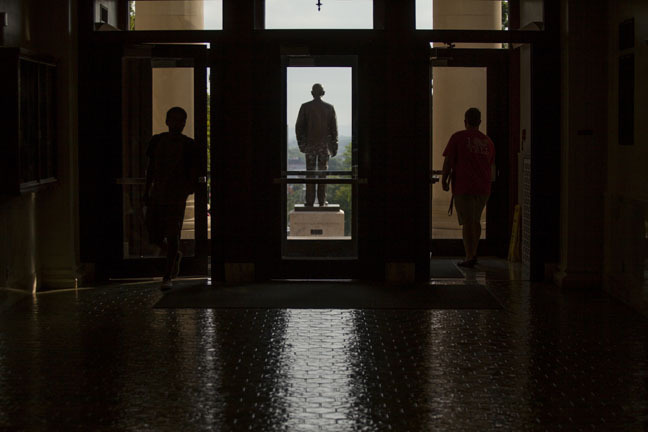Career Opportunities
What Can I do with an English Degree?
Many liberal arts students adopt their majors more as life paths and/or declarations of their passions, than as conduits to narrowly defined jobs. In the case of English, the commitment is to the quintessential human activity, language as a measure of and vehicle for experience and imagination, for theories and ideals, for reason and rhetoric, for logical and emotional appeal, and as a means of understanding human nature and encouraging personal growth.

You may be an aspiring writer with a compelling desire to hone your craft. Or, drawn by your love of the written word, you may elect the literature option as a way to improve your analytical thinking and enhance your cultural literacy.
On the other hand, you may adopt the professional writing option because you want to work in publishing and editing. Or, perhaps you plan to teach English at the high school level or to teach English as a Second Language abroad.
The good news is, even if you simply feel compelled to follow your bliss, without knowing exactly what your day job will be, an English major is an excellent choice in today's market. Communication and analytical thinking are valuable skills that will prepare you to adapt to the career shifts that are predicted for 21st century graduates.
This guide is intended to help you consider how to use an education in English to prepare for a rewarding career.
You may think that everyone who majors in English plans to end up in a "words delivery" career of some sort, but that's not the case. See our Alumni Profiles Page to see many of the interesting careers our own graduates have pursued.
See the table* below for a brief list of sample job titles held by former students with English majors:
Possible Careers in English |
||
|
|
|
And many more! |
||
*The list in this table is not exhaustive.
The question is not so much "What can you do with an English degree?" as "What can't you do with it?"
This list of careers from English graduates demonstrates the flexibility of the English major. Liberal arts majors in general, and English majors in particular, are ideally positioned to adapt as the marketplace requires accommodating cultural differences, assimilating new ideas, and learning new skills.
English majors develop numerous transferable career skills and can find employment in a wide variety of occupations.
Aside from the fields you may expect to find them in--education, publishing, communications, library work, and journalism--English majors can also find employment in other areas such as intelligence work, industry, public service, human resources, lobbying, and professional studies such as law and medicine. You might be surprised to know that Newsweek reports in their 2010 article "Well-Rounded Docs," medical schools are seeking students with "non-science backgrounds," including English majors. The medical field needs "more well-rounded students who can be molded into caring and analytic doctors," which equates humanities majors. According to their 2012 article, "Future Law Students Should Avoid Prelaw Majors, Some Say," US News argues that applicants to law school with humanities degrees will have an advantage when taking the Law School Admissions Test (LSAT).
Sometimes liberal-arts majors struggle a bit more than other majors when launching their careers, but the evidence shows that they tend to advance farther and be more sought out by CEO's for high-level jobs than non-liberal arts grads. . . Employers can train new hires in specialized skills on the job. But they can't train workers to have the critical-thinking skills, problem-solving skills, and the capacity for lifelong learning that today's organizations require.
--Katharine Hansen, Chief Writer for Quintessential Resumes and Cover Letters
Our students are trained for leadership in business, public service, and not-for-profit organizations because they are sensitive to the condition of all men and women, they understand the forces that complicate human life, and they recognize the choices that make us heroic or tragically compromised. [They] can contextualize and historicize human experience, and they are mindful of the tropes and narrative patterns that a society employs to represent itself. English majors think critically and express complex ideas with clarity and acute awareness of audience. They are trained in the world of ideas and the power of artistry.
--Dorothy Baker, Association of Departments of English Bulletin (Winter 2003)
English majors have more to offer the workplace than their expertise as readers and writers.
Among the skills English majors gain are several that work to their advantage in managerial positions. Exposure to a wide variety of ideas and culture promotes tolerance of different points of view; study of human nature through literature develops an ability to relate effectively to people; systematic study of literature prepares them to handle complex ideas; and mastery of information retrieval systems helps them to do the background work and "see the big picture."
To put a liberal education to work, you need to plan ahead!
As is the case for almost any major, you cannot simply sit on your hands waiting for an opportunity to present itself. For more information on prospective careers, and for assistance with employment goals or skill development, visit the Advising and Career Development Center.
Some of the links on this page may require additional software to view.

